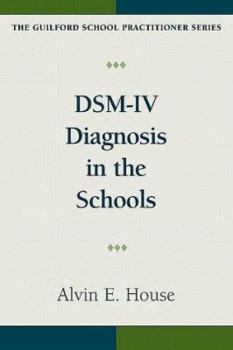DSM-IV Diagnosis in the Schools
This clearly written guide provides a succinct overview of the principles of diagnostic classification used by the DSM-IV. It shows how the DSM-IV works as a method of organizing and communicating our... This description may be from another edition of this product.
Format:Hardcover
Language:English
ISBN:1572303468
ISBN13:9781572303461
Release Date:December 1998
Publisher:The Guilford Press
Length:230 Pages
Weight:1.05 lbs.
Dimensions:9.3" x 6.3" x 1.0"
Customer Reviews
3 ratings
2002 Updates for DSM IV-TR and IDEA 97 Revised
Published by Thriftbooks.com User , 23 years ago
Alvin House incorporates some true wisdom into this reference. Indeed they are in my opinion bits of details that are either not taught in grad schools or not emphasized in training people to work with school populations. As opposed to adults, he points up, children's diagnoses are fluid and evolving- there are, if we are effectively treating the conditions, more opportunities to bypass chronicity and co-morbid patterns. Less matching symptom to condition to diagnosis. (Another reason, for the No Child Left Behind Folks- to re-evaluate frequently- not, as they would have, to eliminate the need for the 3 year requirement.) Furthermore, he warns of a real personal irritant, and that is NOT TO TAKE KIDS AT THEIR WORD, when discussing their emotions and their reactions to their world. He puts it better than anyone I've ever heard when he says that when you're ruling out mental illness, depression, anxiety, etc. remember, "Kids walk the walk, they don't talk the talk!." You need to use collateral information, observation, medical reports, etc. Some other gems-Always be careful with a personality diagnosis and never diagnose when the youngster is in the throes of an acute mood disorder, depressive reaction, adjustment,etc. The integration of the revised manual with the latest IDEA interpretations is the best that I have found. Read the complicated but controversial 'label' and 'classification' debacle for Social Maladjustment and/ or Disruptive Behaviors. The former does not qualify for an IEP but the latter as a condition of ADD and many others- does. Look out as well for the changes relative to those and the politicized furor over discipline in special education. If an eligible child misbehaves as a result of his disability- technically, that child should not be excluded or otherwise consequenced. They are moving to amend that- truth be told, nobody upholds it anyway- but it can always lead to litigation. I encourage people to remain abreast of those IDEA revisions as well as the ramifications of erring on the diagnosis- high stakes- for the child, and for you.Other updates are more about spectrum disorders, clustering of symptoms and, the diagnosis of conduct disorder- which I understood was no longer to be given to anyone under 18. Any of the disruptive, (externalizing) behaviors - You get my drift- dx's- should be evaluated as to if they are a result of environmental malignancy, (Like that?) or the neuropsychiatric composition of the child. Nature vs. Nurture.The weakness in this and every resource I have checked is in the Learning Disorders. I cannot tell you how many people are wandering around shaking their head over the Disorder of Written Expression DX. Kids who write get it. Kids who comprehend get it. Kids who can write lousy but can write get it- then those kids get accused of laziness and as one mom put it, "Is my son using his IEP as a crutch?" He covers the changes in PDD, Tics as they are either involuntary musc
EXCELLENT SPECIAL EDUCATOR'S RESOURCE!
Published by Thriftbooks.com User , 24 years ago
This is a excellent resource for the special education teacher. The information given in this book helps decipher many terms used in psychiatric evaluation of students with special needs. This is definitely a valuable tool for anyone working in Special Education.
An absolute necessity for all school psychology students.
Published by Thriftbooks.com User , 27 years ago
This is a well organized, clearly written text that takes the reader step by step through the DSM-IV process. It presents a strong rationale for the use of the DSM-IV in schools and points to the importance of developing a clinical perspective within the field of school psychology. This is a wonderful text. It should be required for all school psychology students.






